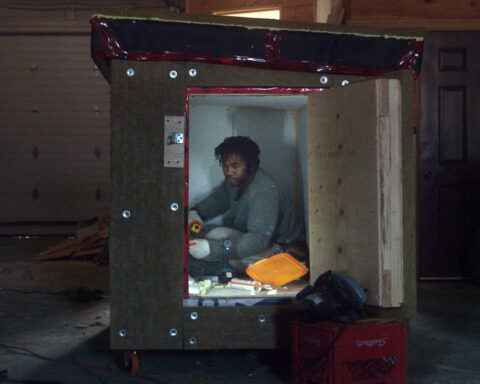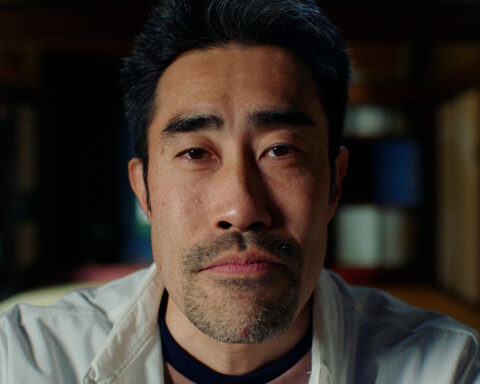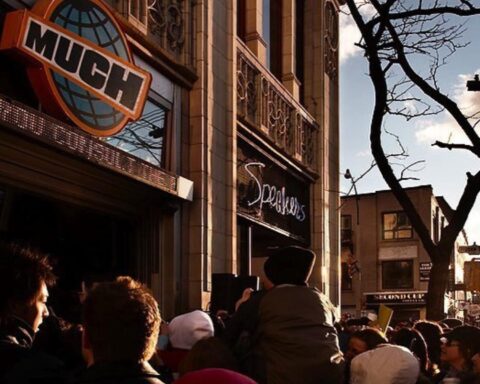The Trial and Donbass
(Netherlands, 127 min.; Germany/Ukraine/France/Netherlands/Romania, 121 min.)
Dir. Sergei Loznitsa
Sergei Loznitsa must be unique in the history of film in working in three distinct modes. This year, madman that he is, he released three films, one from each mode. At Hot Docs, I saw his latest observational documentary, Victory Day, which pursues the vein he has previously tapped in work like Austerlitz (2016) and Maidan (2014). In these works, Loznitsa’s approach is austere: long takes; wide shots; little in the way of incident; an obsessive focus on crowds. It’s like the last shot of Michael Haneke’s Caché (2005) blown up into an entire aesthetic.
In addition to this mode—which, let me just say, would have been enough to vault Loznitsa into the upper echelon of current filmmakers—he has also maintained simultaneous practices in fiction film (A Gentle Creature [2017], My Joy [2010]) and a very particular type of archival film that aims to bridge the expanse of history and reconstruct historical events as they actually happened (The Event [2015], Blockade [2006]). (It bears mentioning that though each mode is completely different on the level of aesthetics, each is fundamentally about a different facet of the same thing, namely the history of eastern Europe. Briefly, the fiction films show how history acts upon and through individuals in the present; the observational documentaries show crowds embodying historical forces, sometimes unwittingly; and the archival films bring historical events to life.)
At TIFF, Loznitsa premiered films from both his fictional and archival modes. The Trial is an archival film that reconstructs a Stalinist show trial from 1930. Donbass is a fiction film somewhat in the vein of Roy Andersson’s A Pigeon Sat On A Branch Reflecting On Existence (2014) that grapples with the ongoing conflict in eastern Ukraine in a series of mostly disconnected absurdist episodes.
After the screening of The Trial, Russophones in the audience commented on the strangeness of the language used by the trial’s defendants in their testimonies: circuitous, long-winded, and ultimately devoid of meaning. That certainly validated my own feelings: try as I might, I couldn’t follow what was happening in the film at all. It was nice to know that native speakers couldn’t either. The fact is, there’s nothing to follow. A title card at the end of the film notes that the party on trial, much less the alleged conspiracy to overthrow the Soviet Union with the help of France’s president Poincaré, didn’t exist. The whole thing was totally made up. It makes for disorienting viewing, akin to trying to parse paranoid logorrhea—every word makes sense but the grammar is elusive. It’s even stranger to see the filled-to-capacity courtroom and mass anti-Poincaré protests with which the trial is greeted. The film’s present-day resonances, right down to the Kafka reference in its title, could not be clearer, or bleaker. Language dies, spectacle rises, violence ensues.
Loznitsa’s documentaries, both observational and archival, can feel like allegories, less interested in detail than in abstraction and the longue durée. The fictional Donbass, by contrast, digs deep into the confusion of the war in Ukraine, with an eye, in particular, to the absurd ways in which the poles of the conflict, Russia and the E.U., are constructed in people’s imaginations. To the Russian sympathizers that make up much of the film, the E.U. equals Germany equals fascism, while Russia equals pride and valour. To the German journalists trying to report on the conflict, the soldiers are all backwards macho posturers. In a hospital maternity ward, corruption surrounding rations reaches Soviet proportions. And violence is never far away.
For all that, there is always something lacking in Loznitsa’s fiction and archival films. Even in their absurdity, they are somehow a bit too clean; even with a plethora of strong scenes and skilled directing, they can feel a bit schematic. Loznitsa’s observational documentaries win their points through stringent attention to chaos of the real world, highlighting here and underlining there to construct powerful arguments. The Trial and Donbass work with a slightly heavier hand. Loznitsa himself says that _The Trial’s _audience will be mainly comprised of history students. Nevertheless, they are strong films the help to flesh out a body of work that is among the most politically engaged in contemporary cinema—all the more so for the equal weight it gives to past and present.











